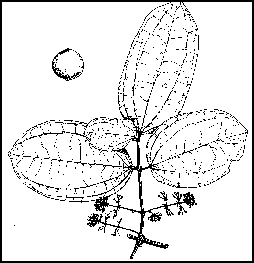STRYCHNOS MELINONIANA - DEVIL'S DOER.
 Common name
Common name
Dobrudua, devil's doer, devildoer, faiseur de diableries.
Family
Loganiaceae (Logania family).
Overview
Dobrudua is a woody vine (liana), almost as large as a tree, from the
Amazon rainforest; specifically the Guianas.
There are two varieties: the red and the white dobrudua indicating the color of the rough outer bark. This is a grey or red
canopy climber up to 6 inches in diameter.
The leaves, with 1 (one) cm short petioles, have five head nerves standing in pairs attached to twigs and have a pointed top;
the flowers are white and sweet aromatic smelling like roses.
The fruit is a berry.
Dobrudua contains the alkaloid Melinonine A, a calabash-curare alkaloid.
Also: Melinonine G (flavopereirine), B, E, F, J, K, L, M.
The alkaloids act as adrenergic blocking agents, dilates blood vessels of the skin and mucous membranes and thereby lowering
the blood pressure.
Dobrudua also increases reflex excitability in the sacral (lower) region of the spinal cord.
 The present phytochemicals block or stimulate the release of adrenaline at nerve endings at different parts of the body.
The present phytochemicals block or stimulate the release of adrenaline at nerve endings at different parts of the body.
Researchers think that this action changes blood flow or the transmission of nerve impulses to genital tissues.
Shamans in Suriname regard devil doer as a natural alternative for Viagra®; Cialis® and others;
it is also used in magic rituals of these shamans.
Suriname's Traditional Medicine
A solution in water is used for the general potency while a tincture (alcohol solution) is used
as a very powerful bitter aphrodisiac.
The plant contains flavopereirine which is used for cancer treatment such as prostate cancer.
Visit our APPLICATION & DOSAGE -,
CHOLESTEROL -,
DIABETES - ,
HYPERTENSION - and
TINCTURE pages.
Hardiness
USDA zone 10 - 11.
Propagation
Seeds and cuttings.
Culture
partly sun, moist soil; it needs high humidity.
|


 Common name
Common name